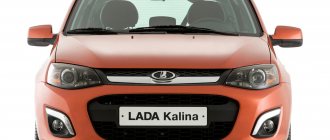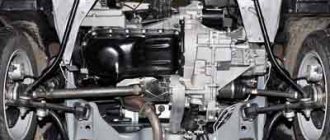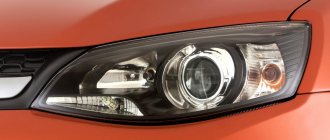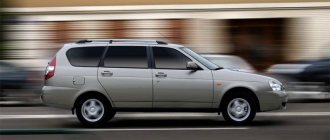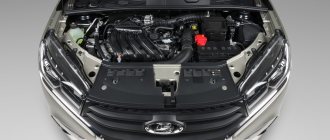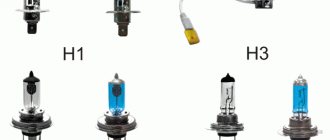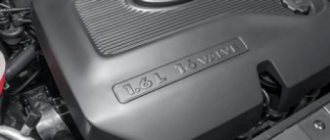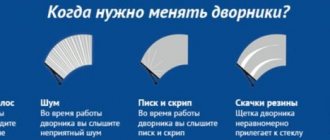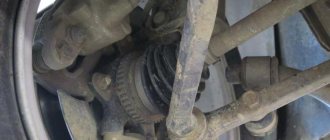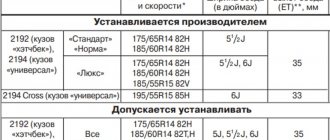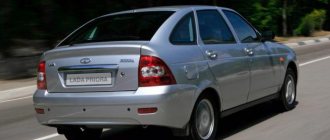Performance characteristics of VAZ 1119 Lada Kalina hatchback
Maximum speed: 165 km/h Acceleration time to 100 km/h: 12.9 sec Fuel consumption per 100 km in the city: 11.0 l Fuel consumption per 100 km on the highway: 6.1 l Fuel consumption per 100 km in the combined cycle: 7.8 l Fuel tank volume: 50 l Vehicle curb weight: 1080 kg Permissible gross weight: 1555 kg Tire size: 175/70 R13
Engine characteristics
Location: front, transverse Engine capacity: 1596 cm3 Engine power: 80 hp Number of revolutions: 5200 Torque: 120/2700 n*m Power system: Distributed injection Turbocharging: no Gas distribution mechanism: no Cylinder arrangement: In-line Number of cylinders: 4 Number of valves per cylinder: 2 Recommended fuel: AI-95 Environmental standard: EURO II
Brake system
Front brakes: Disc Rear brakes: Drum
Steering
Power Steering: Electric Power Steering Type: Rack and Pinion
Transmission
Drive: Front Number of gears: manual gearbox - 5 Gear ratio of the main pair: 3.7
Suspension
Front suspension: Shock absorber strut Rear suspension: Trailing arm
Body
Body type: hatchback Number of doors: 5 Number of seats: 5 Vehicle length: 3850 mm Vehicle width: 1700 mm Vehicle height 1500 mm Wheelbase: 2470 mm Front track: 1430 mm Rear track: 1410 mm Ground clearance (clearance): 160 mm Trunk volume: 235 l
| 11193 | 11193-40 | 11194 | 11196 | |
| 2006– | 2006–2013 | 2007– | 2011–2013 | |
| basic | ||||
| steering wheel location | left | |||
| Number of doors | 5 | |||
| number of seats | ||||
| Total | 5 | |||
| of them are inferior | ||||
| geometry | ||||
| dimensions | ||||
| length | 3 850 mm | |||
| width | 1,700 mm | |||
| height | 1 500 mm | |||
| wheelbase | 2,470 mm | |||
| track | ||||
| front | 1 430 mm | |||
| back | 1 410 mm | |||
| ground clearance | ||||
| standard | 160 mm | |||
| weight | ||||
| equipped | 1,080 kg | 1,155 kg | 1,080 kg | |
| full | 1,555 kg | |||
| engine | ||||
| Name | VAZ-21114 | VAZ-11183 | VAZ-11194 | VAZ-21126 |
| type | Piston | |||
| location | front, transverse | |||
| supply system | injector | |||
| cylinders/valves | l4/2 | l4/4 | ||
| volume | 1,596 cm³ | 1,390 cm³ | 1,597 cm³ | |
| power | ||||
| power | 81 hp | 82 hp | 89 hp | 98 hp |
| ranging from | 5,200 rpm | 5,100 rpm | 5,250 rpm | 5,600 rpm |
| torque | ||||
| torque | 120 Nm | 132 Nm | 127 Nm | 145 Nm |
| ranging from | 2,700 rpm | 3,800 rpm | 4,200 rpm | 4,000 rpm |
| in the range up to | 2,700 rpm | 4,800 rpm | ||
| compression ratio | 10 | 11 | ||
| fuel | AI-95 | |||
| turbocharging | No | |||
| cooling | liquid | |||
| Gas distribution mechanism | SOHC | DOHC | ||
| transmission | ||||
| drive unit | front | |||
| Transmission | Manual transmission 5 | |||
| clutch | Single disc, dry | |||
| suspension and steering | ||||
| steering type | Rack and pinion, with electromechanical amplifier | |||
| dynamic characteristics | ||||
| maximum speed | 160 km/h | 164 km/h | 165 km/h | 183 km/h |
| acceleration to 100 km/h | 12.9 sec | 12.5 sec | 12.2 sec | 11.5 sec |
| speed limiter | No | |||
| performance characteristics | ||||
| fuel tank volume | 50 l | |||
| trunk volume | 235–545 l | |||
| fuel consumption | ||||
| Unspecified method | ||||
| in the city | 9.8 l/100km | |||
| on the road | 5.3 l/100km | |||
| mixed mode | 7.8 l/100km | 7.3 l/100km | 7 l/100km | 7.2 l/100km |
| brake system | ||||
| ABS | No | Yes | No | Yes |
| front brakes | ||||
| description | Disk | ventilated disc | ||
| rear brakes | ||||
| description | Drums | drums | ||
| wheels and rims | ||||
| front | 5J × 13 175/70 R13 | 5.5J × 14 175/65 R14 | ||
| rear | 5J × 13 175/70 R13 | 5.5J × 14 175/65 R14 | ||
Main characteristics of the car
The elegant Kalina
VAZ 1119 is the first generation of the model, which was produced from 2006 to 2022. The trunk volume of the car is 235 liters. Due to the high opening and the ability to quickly fold the rear seat, the Kalina VAZ 11193 is capable of transporting large loads.
The hatchback is available in 3 options.
- Standard.
- Norm.
- Luxury
The advantages of the top and middle versions include the presence of ABS, front airbags and an air conditioning system with a corresponding split system. The “Lux” package of Lada Kalina 111930 provides improved upholstery of the interior and door panels. The car interior is spacious and comfortable. If necessary, its tuning is possible.
The characteristics of lighting technology and the modern appearance of the VAZ 1119 contribute to an increase in demand for this model. You can buy it through official VAZ dealers. The catalog will familiarize everyone in detail with the technical capabilities of the car, body colors and other details that need to be taken into account when purchasing a vehicle.
Prices for each model are calculated individually. Car owners of Lada Kalina 1119 leave positive reviews about their vehicle. This economical car is perfect for both city travel and long-distance travel.
Contraindications and harm
The main contraindications of viburnum:
- individual intolerance;
- excessive blood clotting;
- hypotension;
- thrombophlebitis;
- high stomach acidity;
- pregnancy period;
- arthritis;
- exacerbation of gout;
- peptic ulcer;
- pancreatitis.
To eliminate potential harm from viburnum, follow the recommended dosage when consuming berries and products based on various parts of the plant.
The calculation of the portion that allows you to understand how much viburnum you can eat per day depends on the disease being diagnosed. To increase immunity, a healthy adult is recommended to consume 5-6 tbsp per day. l. ripened fruits.
VAZ 1119 Kalina hatchback technical specifications
Performance characteristics of VAZ 1119 Lada Kalina hatchback
Maximum speed: 165 km/h Acceleration time to 100 km/h: 12.9 sec Fuel consumption per 100 km in the city: 11.0 l Fuel consumption per 100 km on the highway: 6.1 l Fuel consumption per 100 km in the combined cycle: 7.8 l Fuel tank volume: 50 l Vehicle curb weight: 1080 kg Permissible gross weight: 1555 kg Tire size: 175/70 R13
Engine characteristics
Location: front, transverse Engine capacity: 1596 cm3 Engine power: 80 hp Number of revolutions: 5200 Torque: 120/2700 n*m Power system: Distributed injection Turbocharging: no Gas distribution mechanism: no Cylinder arrangement: In-line Number of cylinders: 4 Number of valves per cylinder: 2 Recommended fuel: AI-95 Environmental standard: EURO II
Brake system
Front brakes: Disc Rear brakes: Drum
Steering
Power Steering: Electric Power Steering Type: Rack and Pinion
Transmission
Drive: Front Number of gears: manual gearbox – 5 Gear ratio of the main pair: 3.7
Suspension
Front suspension: Shock absorber strut Rear suspension: Trailing arm
Body
Body type: hatchback Number of doors: 5 Number of seats: 5 Vehicle length: 3850 mm Vehicle width: 1700 mm Vehicle height: 1500 mm Wheelbase: 2470 mm Front track: 1430 mm Rear track: 1410 mm Ground clearance (clearance): 160 mm Trunk volume: 235 l
Production
Year of manufacture: since 2006
Weight of LADA Kalina
The curb weight of the VAZ Kalina II 1.6 MT station wagon with an empty fuel tank is 1024 (kg).
Weight of modifications:
According to the passport data, the curb weight of the LADA Kalina model is:
- VAZ Kalina I 1.4 MT station wagon (2007 - 2013): 1080 (kg) 1555 (kg).
- VAZ Kalina I 1.4 MT sedan (2007 - 2013): 1080 (kg) 1555 (kg).
- VAZ Kalina I Sport 1.4 MT hatchback (2008 - 2013): 1080 (kg) 1555 (kg).
- VAZ Kalina II 1.6 MT station wagon (2013 - present): 1060 (kg) 1560 (kg).
Algorithm for calculating the weight of a car without fuel:
If it is necessary to determine the curb weight of a VAZ Kalina II 1.6 MT station wagon with an empty fuel tank, then first determine the mass of fuel (MT) in the tank (at maximum filling):
- MT = PT x OB, where PT is the density of the fuel (for gasoline - 710 (kg)/m3); OB is the volume of the fuel tank (50 l, indicated in the car’s passport).
- MT = 710 x 0.050 = 36 (kg).
The curb weight of a vehicle with an empty fuel tank is determined as the mathematical difference between its total curb weight and the fuel weight:
Important: the VAZ Kalina model range is produced by the Russian automobile manufacturer AvtoVAZ, car class: small, 2 generations of the model were produced from 2004 to 2022.
Other names:
The Group II small class car LADA Kalina is also known under the following indices:
Years of production Years of production of all modifications of the model: 2004-2017.
VAZ-11194:
- Modifications of Lada-Kalina: VAZ-11174, VAZ-11184, VAZ-11194, Lada-Kalina Sport (1.4);
- Engine type: four-stroke, gasoline, 16-valve with spark ignition and fuel injection system;
- Number of cylinders – 4;
- The cylinder arrangement is in-line;
- Cylinder diameter – 76.5 mm;
- Piston stroke – 75.6 mm;
- Cylinder displacement – 1,390 l;
- Power system – multipoint injection;
- Ignition system – electronic distributed type;
- Rated power – 65.5 kW;
- Rated crankshaft rotation speed – 5500-5700 rpm;
- Maximum torque – 127 Nm (at 4200-4800 rpm);
- The minimum crankshaft rotation speed at idle is 810-870 rpm;
- Fuel – gasoline “Premium-95” GOST R 51105-97.
VAZ-21126:
- Modifications of Lada-Kalina: Lada-Kalina Sport (1.6);
- Engine type: four-stroke, gasoline, 16-valve with spark ignition and fuel injection system;
- Number of cylinders – 4;
- The cylinder arrangement is in-line;
- Cylinder diameter – 82 mm;
- Piston stroke – 75.6 mm;
- Cylinder displacement – 1.597 l;
- Power system – multipoint injection;
- Ignition system – electronic distributed type;
- Rated power – 72 kW;
- Rated crankshaft speed – 5600 rpm;
- Maximum torque – 145 Nm (at 4000 rpm);
- The minimum crankshaft rotation speed at idle is 850 rpm;
- Fuel – gasoline “Premium-95” GOST R 51105-97.
Role and device
The tank belongs to the power supply system of the Lada Kalina engine. It is located in the rear of the car under the bottom. The container structure itself is welded. It is attached to the body elements by means of two metal tie straps. In addition to the tank itself, the circuit feeding the engine includes:
- an adsorber that allows you to capture vapors formed inside the container we are considering (located directly next to the tank);
- to prevent these vapors from entering the external atmosphere, there is a special pipe between the adsorber and the tank, connected to the designated components of the system by a separator and a gravity valve;
- a protective screen must be located next to the specified tank;
- a fuel pump assembly with a level sensor is integrated into the upper part of the tank; this device supplies gasoline to the fuel rail through the line;
- the tank has a filler neck through which fuel is replenished;
- At the bottom of the tank there is a fuel filter that allows you to retain debris present in gasoline;
- from the fuel rail, gasoline enters the manifold using injector injection, where it is mixed with air in a certain proportion, after which it is sent directly to the engine chambers;
- excess fuel is supplied through the return line back to the tank (here the process is controlled by a pressure regulator present directly on the ramp); this partly allows one to avoid a significant increase in temperature and pressure, relieving the system of abundant vaporization of the fuel.
Dimensions
Compared to previous VAZ models, the Lada Kalina has increased in size, which has a positive effect on the space in the cabin and the amount of luggage space in the trunk; the dimensions are noticeably larger. Note that the height, as well as the width, of the car remained unchanged, but the length increased noticeably.
New Lada: Lada Kalina body rigidity
It is these dimensions that now amount to 3.89 m. Let us recall that the width is 1.7 m and the length is 1.5 m. These are the dimensions of the car body. Another significant advantage of the Kalina is the ability to be equipped with an automatic transmission unit. The owners immediately appreciated this move, which allows the nimble Lada Kalina to “tolerate” city traffic jams well.
Let's touch on the body. For the practical “Russian”, the developers have provided an all-metal body frame.
The vehicle's curb weight reaches 1160 kg, and with full regulatory load it is 1560 kg. Moreover, we have already reported the dimensions of the body above, and they are not small.
We know the dimensions of the body, it’s time to talk about the dimensions of the luggage compartment Kalina now offers the owner a number of advantages. If you fold the back rows, the useful volume of space for placing cargo “grows” to 550 liters. Here, practical drivers will appreciate this solution, since they often have to transport items whose dimensions exceed the parameters of the trunk itself.
The station wagon modification has also grown significantly in size. The manufacturer has additionally equipped the roof of this body version with roof rails, which allows the owner to install an external luggage compartment for transporting large luggage.
The length of the station wagon exceeds 4 meters, which is longer in comparison with a hatchback or the same sedan. The width of the version remains unchanged - 1.7 m, which is also true for the height - 1.5 m.
Separately, we should touch upon the trunk of the station wagon, which has no competitors in the model line of all LADA Kalinas. Folding the backrests of the stern seats allows you to “increase” the volume of usable space to an incredible 670 liters for this class.
The fuel tank on the station wagon has been migrated from the sedan, which confirms the identical volume, capable of holding a maximum of 50 liters.
new-lada.ru
Features of the Cross modification
When considering the entire list of modifications of the LADA Kalina, one cannot ignore the outstanding VAZ project - the Cross version. This car is built on the basis of a station wagon, but has an impressive list of additions. Here the developers have placed significant emphasis on the ground clearance, which is an enviable 208 mm. The perimeter of the body is decorated with decorative linings, which simultaneously perform a protective function. On small off-road terrain the car behaves quite confidently. The developers did not forget to use enhanced protection for the engine sump and transmission unit housing.
Dimensions value
The Kalina family is small but friendly. Some are a little bigger, some are a little smaller, but together they can make it to the parade. The body of the Lada Kalina is made in several modern modifications: sedan, hatchback, station wagon, cross and sport. Their overall dimensions do not vary much.
| Sedan | Hatchback | Station wagon | Cross | Sport | |
| Length, mm | 4040 | 3850 | 4040 | 4104 | 3943 |
| Width, mm | 1700 | 1700 | 1700 | 1700 | 1700 |
| Height | 1500 | 1500 | 1500 | 1560 | 1450 |
| Weight | 1098 | 1098 | 1128 | 1125 | 1150 |
| Base | 2476 | 2476 | 2476 | 2476 | 2476 |
| Clearance | 160 | 160 | 145-160 | 183 | 150 |
The width and wheelbase are the same for all, as it should be for related models. But the length, height and ground clearance are different. Accordingly, the volumes and masses are different. The history of Lada models has seen long stagnation and a period of failure. In 2004, the release of the first Kalina from the assembly line ushered in a new era. Since then, new items appear almost every season, and the ranks of owners of the most popular car in Russia are growing from year to year.
The geometric dimensions of the body are important, but no less interesting is the volume of the trunk. All Kalina models are designed to allow the rear seats to be folded forward and increase luggage compartment space. The most voluminous trunks are for the sedan, station wagon and cross: 355/670 liters. “Hatchback” and “sport” are more modest - 240/550 hp. It’s also not bad, as many city car owners will agree with.
In the ranks of Kalina there is another model - Lada Kalina City (Oka-3), made on the VAZ-1117 platform. It appeared in 2005 and for some time was considered a replacement for the Oka small car, but this assumption is incorrect. It has almost the same dimensions, height and width as other Kalinas, only the length is 3650 mm.
There is another dimensional indicator that is rarely interested in until they get stuck in a rut. At this point, some people discover the fact that the distance between the front wheels is different from the distance between the rear. This parameter is called: front and rear wheel track. For the “sedan” and “hatchback” with “station wagon” - 1430/1414 mm, for the “sport” - 1431/1432 mm and for the “cross” - 1430/1418 mm.
New Lada: Lada Kalina 1 and 2 tank volume: how many liters
The difference in millimeters may not be noticeable to the eye, but it is easy to feel when a few millimeters are not enough to get out of an icy rut on a winter road. The track size turned out to be wrong.
Lada Kalina - Car Owners Blog: Spaciousness and Load Capacity
In total, it turns out that each package of these cocktails contains 13.5 kilograms.
And the total weight of this cargo, which I needed to carry for 200 km, was 405 kg. Of course, all the packages did not fit into the trunk and interior of Kalina; we had to completely fold out the rear seats, or rather, fold them in reverse, so that almost the entire interior became free. I loaded all these packages, they went in fine, of course I had to sweat a little to push them all into the cabin, but all 30 of them went in as expected. I loaded myself to capacity, and rushed off to deliver all this stuff to the stores I serve. My Kalina, of course, squatted a little, but I was convinced that the Kalina Station wagon has a much more powerful suspension than the same sedan or hatchback. During the whole trip, and the road in our regions is certainly not sweet, my Kalina never gave a breakdown in the suspension, I didn’t hear a single knock from the suspension the whole trip.
Still, with inflated tires, damage to the rims will be minimal, and if you adhere to the speed limit and drive carefully, you can avoid bent rims and herniated tires. And one more recommendation, in order not to bend the wheels when falling into holes, it is better not to put low-profile tires on your Kalina, and constantly monitor the pressure in the tires, but you should not overinflate them either, since the suspension is also not eternal.
Constructions
Engine 11193 is designed for installation on the Lada Kalina car of various modifications. Volume 1.6 liters and power 102 hp. Enough for this car. An in-line engine is located transversely in the engine compartment. 4 cylinders with a diameter of 82 mm consume 9.6 liters of gasoline per 100 km.
The design features include:
- frequent damage to the drive system belt, blockage of oil, fuel and air filters;
- possible defects of piston rings;
- decrease in oil pressure.
Features of motor 11193
To avoid serious consequences as a result of these malfunctions and increase the service life of the engine, it is recommended to change the belts on it after 50-65 thousand km of the vehicle.
The parts are made of high quality steel and have increased strength. To increase power by 10%, the throttle valve is equipped with an electric drive. This also ensured a reduction in exhaust gas toxicity. The valve mechanism consists of 16 valves. A block with an improved cylinder surface meets the requirements of the times. You can find it by color: block 11193 is painted gray.
If you have to sort out the unit, after removal the following are dismantled:
- pump operating in the cooling system;
- generator;
- electric starter;
- fuel system pump;
- collectors;
- camshaft belt;
- valve cover;
- flywheel;
- clutch mechanism;
- cylinder head.
Defective parts are immediately replaced. Oil seals, seals and gaskets are replaced. Assembly is carried out in reverse order. Before driving, it is necessary to inspect the main components of the car and constantly monitor the readings of technical fluid level sensors.
The engine can be installed on the tenth car model. All bosses and mounting holes of the cylinder block are suitable for this. It is not advisable to do tuning or modifications so as not to damage the engine.
Design 11193
Description
The increase in cylinder volume was achieved through the use of a higher cylinder block than that of the prototype. Its height is 2.3 mm higher than the height of the 2111 engine block and is 197.1 mm (from the crankshaft axis to the top surface). The diameter of the cylinders did not change, but the dimensions and shape of the combustion chamber had to be changed.
The cylinder head is made of aluminum alloy. A camshaft is installed in its upper part, and special ducts are cast in the lower part, designed to supply coolant to the combustion chambers. The same channels are also available in the cylinder block housing.
The crankshaft and camshaft of the engine are cast from cast iron, the pistons are made from aluminum alloy. Forged connecting rods (steel).
A new generation is replacing
In 2022, Russian roads welcomed the new Lada-Kalina 2 model. It immediately caught the fancy of those who were passionate about VAZ products, and began to win new fans. In terms of body models, Kalina 2 is currently limited to hatchback and station wagon.
They repeat their predecessors in height 1500 mm, ground clearance 210 mm, wheelbase 2476 mm and track: rear 1414 mm / front 1431 mm.
Other dimensions are not the same. Body control dimensions show:
- “hatchback” - length 3893 mm and width 1700 mm;
- “station wagon” - 4084 mm and 1539 mm;
- The trunk volume is the same - 260/361 liters.
Nothing in the world is perfect, there will always be critics and detractors. Nevertheless, even a cursory glance at what ordinary users write, sharing their impressions without the goal of advertising anyone, confirms: “Lada-Kalina 2” is a good city car. If we add to the above such important parameters as “price - quality” and “gasoline consumption in the city”, then it can be considered one of the leaders in its market segment.
The same opinion can be heard in any “garage fraternity”, where they express themselves artlessly, but with knowledge of the matter. Popular approval has been received, as has the expectation of new models.
New Lada: Repair and operation manual for Lada Kalina, VAZ-11183, VAZ-11184.
Let's sum it up
Note that the Togliatti people managed to significantly transform the LADA Kalina in comparison with the previous version. All modifications have acquired new advantages, among which the addition of automatic transmissions has become especially relevant. We agree that the developers did the right thing by releasing the Cross version, which, in terms of consumer qualities, many owners compare to a small crossover.
For the Lada Kalina car, the dimensions are designed well for Russian cities and courtyards. She doesn't look overly petite. There is some solidity in it, and at the same time, “Kalina” is able to find a place for itself in the tightest parking lot. What is not a competitive advantage in these difficult times? Especially when looking for some free spot to leave the car near the house.
general characteristics
classifies Lada Kalina as a subcompact model. These cars performed excellently in urban conditions. For optimal operation, the range of external temperatures ranges from minus 40 to plus 45 degrees (Celsius). Also, to ensure that this vehicle exhibits its optimal characteristics, it must be used on paved roads.
Most Lada Kalinas are equipped with 8-valve engines. There are also versions with engines whose heads are equipped with 16-valve designs. Such motors are marked as “11194” and “11184”. Both versions of the power unit are located in the engine compartment according to a transverse arrangement. The power plants are equipped with modern distributed fuel injection systems.
The exhaust manifolds of these models have exhaust gas catalysts, which is done for the sake of the environment.
As a modern option, you can consider remote control of the central door lock and window drives. Also, as an option, a locking unit for the luggage compartment lock can be installed.
If there is a need to activate or deactivate the security system, then such an action is available in any situation. This mechanism allows you to lock all doors at once. This useful feature allows you to quickly lock yourself in your car, for example, while hiding from being chased.
Tuning Granta sedan
Lada Granta won't start
lada granta crash test
Body weight of Lada Kalina Hatchback
The average body weight of the Lada Kalina Hatchback ranges from 275 (kg) to 330 (kg).
What is body mass:
Body weight refers to the weight of the part of the vehicle designed to accommodate passengers and cargo.
In most cases, body weight means the weight of the entire vehicle without accessories, doors, windows, bridges, etc.
As a rule, the mass of a car consists of the following main parts:
- engine, generator, starter, etc.;
- Transmission;
- full suspension;
- plumage (bumpers, radiators, etc.);
- body, etc.
Important: the weight of the body does not include any elements of interior equipment, upholstery, decor, etc.
What data is presented in the directory:
The weight of a conventional sedan-type body most often ranges from 250 (kg) to 400 (kg).
The table below presents all available information regarding the weight of Lada Kalina Hatchback cars.
Important: most often, manufacturers do not indicate the mass of bodies separately, therefore it can only be calculated indirectly by subtracting the mass of the component parts from the total mass. Therefore, such data will always be approximate.
Years of production Years of production of all modifications of the model: 2006-2017.
Specifications
The technical characteristics of the VAZ 11193 engine are not much different from its predecessor 1118. In fact, the engines can be called identical, but differences still exist. So, let's look at the technical characteristics of the power unit.
| Name | Characteristic |
| Brand | Lada |
| Model | 11193 |
| Engine capacity | 1.6 liters (1596 cc) |
| Power | 102 |
| Location | Transverse |
| Consumption | 9.6 liters for every 100 km |
| Number of cylinders | 4 |
| Number of valves | 16 |
| Piston diameter | 82 mm |
| Cooling | Liquid |
| Fuel | Gasoline (gas - as additional equipment) |
| Torque | 137 Nm |
The VAZ 11193 engine has become a logical continuation for the Kalina family, and it is also installed on the 10th generation of Lada vehicles. As you can see, the engine is quite powerful and is enough for such a small car as Kalina. If we talk about 10th generation cars, then it is quite weak.
Engine
On the VAZ Kalina, 2 types of cylinder heads were installed: 16 and 8 valve. The eight-valve engine was installed on all standard models and had relatively low performance. The design of such an engine was much simpler, and it was cheaper to repair or replace parts.
The maximum power of the 8-valve engine is 87 hp, at which Lada Kalina can develop a maximum of 168 km/h. Acceleration to the first hundred is in 12.2 seconds. But the 16-valve engine has as much as 106 hp. The maximum speed of the VAZ Kalina, with such power, is 181 km/h. Acceleration from hundreds - in 11 seconds.
Engine with a volume of 1.6 liters and a power of 98 hp.
Despite the completely different device, fuel consumption does not differ much. The 87-horsepower engine has 6.6 liters, and the 106-horsepower engine has 6.5 liters per 100 km. At the same time, the dimensions of the cylinders are absolutely the same - 1600 cubic centimeters.
Exterior
The appearance of the second generation Lada Kalina remained recognizable, but received a more harmonious, attractive and modern finish. The nose of the car is decorated with a hood with characteristic ribs, and there are also stylish lighting equipment with a darkened background and a massive front bumper with an air intake “mouth” and chrome decor (top trim levels also have fog lights).
The head optics flow smoothly into the narrow strip of the radiator grille. The bumper installed in front is of a relief type with a massive air intake in the center and has fog lights along the edge, which are covered with chrome “eyelashes”. True, we must admit that an air intake of this size does not fit perfectly with the overall design of the Lada Kalina 2.
Thanks to the smoothed body corners, the aerodynamic component has been improved, which has made it possible to reduce the noise of headwinds and make travel at high speeds more comfortable. If you look at the side of the car, you can see the presence of a sloping hood, a slightly sloping roof towards the rear, large door openings and large wheel arches.
All this together allows the hatchback to have a light and moderately dynamic silhouette. The fact that there are no stampings on the side body parts is made up for by the presence of door trims, which give the appearance of the car some relief against the background of the overall smoothing of the appearance. The wheel arches turned out to be a little swollen, and thanks to the high ground clearance of the hatchback, its solidity is felt.
The rear of the Lada Kalina 2 is compact and has beautiful lights, a neat luggage compartment lid and a small bumper with a plastic cover at the bottom, which serves as a protective option. As a result, the domestic new product looks quite good and fresh, and in terms of design it matches foreign cars.
